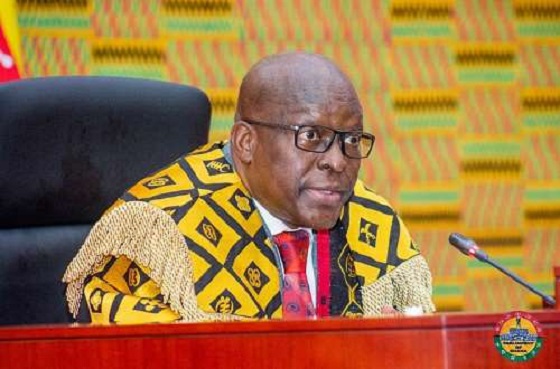Declaring Akwatia Seat Vacant Premature – Speaker
The Speaker of Parliament, Alban S.K. Bagbin, has offered a firm legal and procedural interpretation of what constitutes a vacancy in Parliament following the death of a sitting Member, cautioning against rushing the process without due evidence and formal authority.
His comments followed a submission by Majority Leader Mahama Ayariga, who requested clarification on whether Parliament had officially notified the Electoral Commission (EC) of the passing of their colleague and, by extension, whether a by-election was due within the constitutional timelines.
Citing Article 112(5) of the Constitution and Standing Order 92, the Majority Leader noted that a vacancy in Parliament must be communicated to the EC within seven days of its occurrence, and a by-election must follow within 30 days. He questioned whether these constitutional obligations had been triggered, given that the House had already been formally informed of the death by the Minority Caucus.
“Having officially informed this House as the leader of that caucus that our colleague passed, it has become official communication… So people are asking – has the Clerk, within seven days, communicated to the Electoral Commission?” Mr. Ayariga asked. He stressed the need for the Speaker to provide direction on whether that earlier announcement constituted formal notification of a vacancy.
However, Speaker Bagbin, while acknowledging the importance of the matter, explained that a declaration of vacancy requires more than a verbal communication on the floor. He emphasised that the Constitution mandates a written notice by the Clerk to the EC, based on verified evidence, before any official steps can be taken toward a by-election.
“The Clerk cannot just proceed to write to the Electoral Commission based on what he hears or reads in the news. There must be official and verifiable communication from the appropriate family representatives, confirming the date and circumstances of the Member’s passing,” Mr. Bagbin stated.
Drawing on tradition, legal precedent, and amendments to Article 112(5), the Speaker elaborated that a vacancy triggered by death demands cautious validation, particularly when the deceased is a royal, as is the case in this instance. He referenced past instances where premature declarations of death were later contested, and underscored that only the Speaker, upon sufficient proof, could authorise the Clerk to write to the EC.
Mr. Bagbin also addressed the constitutional amendment which now requires that when a vacancy occurs through the death of a Member, a by-election must be held within 60 days rather than 30. However, he clarified that the trigger for the timeline is not the date the House hears of the death, but the date it is verified and officially recorded in writing.
In supporting the Speaker’s explanation, Minority Leader Alexander Afenyo-Markin clarified that his earlier communication about Ernest Yaw Kumi’s death was made with a caveat – that it was not to be construed as a formal notification that could trigger constitutional obligations.
He said the Minority, Majority, and the Clerk had subsequently visited the family to confirm the news, during which the family acknowledged the MP’s passing but indicated that, due to royal traditions, official notification would come later from the appropriate family heads.
“The family made it clear that they must return to their traditional home and follow the royal process before formally informing the Speaker. Until then, what we did was to show respect and concern – not to formally establish a vacancy,” Mr. Afenyo-Markin told the House. “
He cautioned against politicising the matter or giving the impression that anyone was rushing to fill a seat for political advantage, adding that such sensitivity was critical in moments of national loss.
The Speaker reiterated that although the Clerk accompanied the leadership to the family, he cannot act without official instruction. “The Clerk is an administrator. He cannot write to the Electoral Commission until directed by the Speaker upon receiving verifiable evidence,” he said.
He advised Members to await formal communication from the family through the proper channels, assuring the House that once that is received, the Clerk would act in accordance with the law and within the constitutional timelines.
By Ernest Kofi Adu, Parliament House


